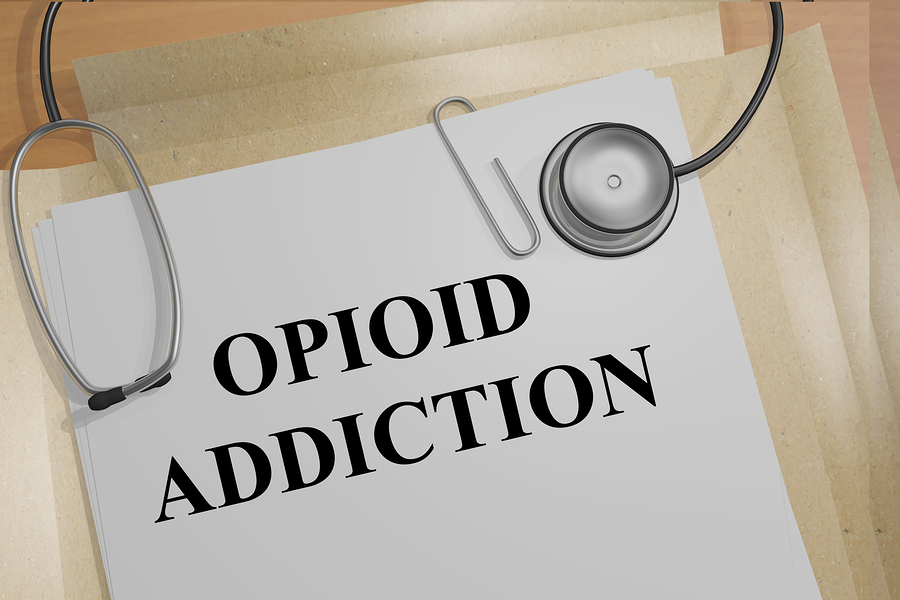People living with a physical or intellectual disability are not immune from substance use disorders during their lifetime. It can be difficult for someone with a disability to get the help they need. The disability they have, may have an enormous effect on whether they get treatment or not. It usually comes down to a family member or a loved one that has the ability to get them into the right treatment .
When a disabled individual becomes addicted, it is important to find help geared towards the disability for success in the recovery process. Having compassion and understanding of their disability is also very important in helping them through overcoming addiction.

According to the U.S. Census Bureau, close to 40 million Americans are living with a disability.
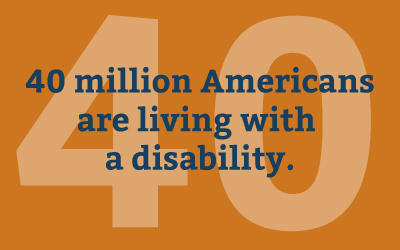 The top five forms of disabilities are as follows:
The top five forms of disabilities are as follows:
- Serious problems with walking or climbing stairs – 20 million people
- Difficult time doing errands independently (going to the doctor, shopping) due to physical, emotional or mental reasons – 14 million people
- Cognitive difficulties – 13 million people
- Hearing problems – 11 million people
- Vision problems, even while wearing corrective lenses – 7 million people
Risk of Substance Abuse Disorders Higher for Physically Disabled
Physical disability may not be one of the risk factors for substance abuse that immediately comes to mind. Raymond E. Glazier, Ph.D and Ryan N. Kling, M.A. published a research paper published in Disability and Health Journal (2013) where they discussed Recent Trends in Substance Abuse Among People with Disabilities Compared to that of Persons Without Disabilities.

The authors looked at several years of data estimates obtained from the National Survey on Drug Use and Health. They found that substance abuse levels in the general population remained level over time at approximately 34 percent. For people with disabilities, the prevalence was higher, at 40 percent. Glazier and King concluded that substance abuse is more common among people with disabilities than the general population.
Why the Physically Disabled May be More Susceptible to Substance Abuse
There could be a number of reasons why a physically disabled person may start to turn down the slippery slope toward substance abuse.
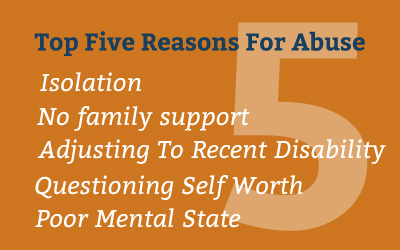 Top Five Reasons The Disabled Are Prone To Abuse Drugs And Alcohol:
Top Five Reasons The Disabled Are Prone To Abuse Drugs And Alcohol:
- If the disability is due to a brain injury, the person may have difficulty or be unable to make the best decisions for himself. He may make reckless decisions without fully thinking through the consequences.
- A work-related injury leading to disability can leave a person questioning their self-worth, especially if she gained a lot of her identity through her career. If she is no longer able to work, she may be left wondering, “Who am I?”
- The “new” reality that comes with a physical disability can mean having to accept some major limitations, especially for a person who was used to enjoying a very active lifestyle before illness or injury.
- Not all friends and family members will be supportive to a person who becomes physically disabled.
- It’s easy for a physically disabled person to feel isolated from peers, physically and emotionally. Going out to do everyday activities, such as errands or shopping is much more challenging, and over time it can become easier just to get into a pattern of just staying home.
A person with a physical disability, who is mourning for the loss of his previous good health, may look to drugs or alcohol as a way to cope with these negative feelings. Drugs may also be a way to cope with chronic pain and feelings of depression.
Intellectual Disabilities and Substance Abuse
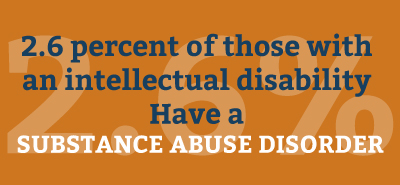 The trend to integrate people with intellectual disabilities into the community provides them with a number of benefits. It does, however, expose this segment of the population to elements like drugs and alcohol. People with intellectual disabilities are less likely than the general population to have opportunities to experiment with drugs and alcohol, notably because they are more likely to live with family, friends or a caregiver.
The trend to integrate people with intellectual disabilities into the community provides them with a number of benefits. It does, however, expose this segment of the population to elements like drugs and alcohol. People with intellectual disabilities are less likely than the general population to have opportunities to experiment with drugs and alcohol, notably because they are more likely to live with family, friends or a caregiver.
This doesn’t mean they are completely immune from becoming addicts. The results of a study performed on Medicaid billing claims concluded that 2.6 percent of those with an intellectual disability also had a substance abuse disorder. Other researchers estimate that this number is far too low, and suggest that the real figure for drug and alcohol addiction among those living with an intellectual ability could be as high as 26 percent.
Co-occurring Disorders Among Those with Intellectual Disabilities
It’s possible for a person with an intellectual disability to be diagnosed with a mental illness and have an addiction issue. Experts estimate that between 7-20 percent of people with an intellectual disability fit this profile.
As these facts and figures about substance use disorders and the disabled clearly indicate, no one is immune from the effects of addiction. Our more vulnerable populations are at higher risk than we may have realized, and they need caring, professional treatment too.
Finding Alcohol and Drug Treatment for Disabled Clients
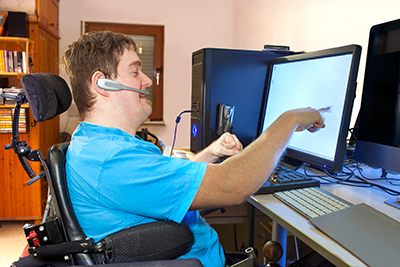 It can be difficult for those struggling with physical and mental disability to find adequate care for drug or alcohol addiction. It’s critical that the facility you choose is equipped to deal your or your loved one’s unique care needs so they can maintain their health and quality of life while in treatment. Finding quality addiction care for physically and mentally disabled individuals usually falls squarely on the shoulders of family and loved ones. While this pursuit can be overwhelming, there multiple resources that help connect patients in need with quality treatment programs.
It can be difficult for those struggling with physical and mental disability to find adequate care for drug or alcohol addiction. It’s critical that the facility you choose is equipped to deal your or your loved one’s unique care needs so they can maintain their health and quality of life while in treatment. Finding quality addiction care for physically and mentally disabled individuals usually falls squarely on the shoulders of family and loved ones. While this pursuit can be overwhelming, there multiple resources that help connect patients in need with quality treatment programs.
Some of these resources include, but are not limited to:

Families are also encouraged to contact their state’s department of mental health or search for treatment facilities that offer specialized addiction care for the handicapped.


